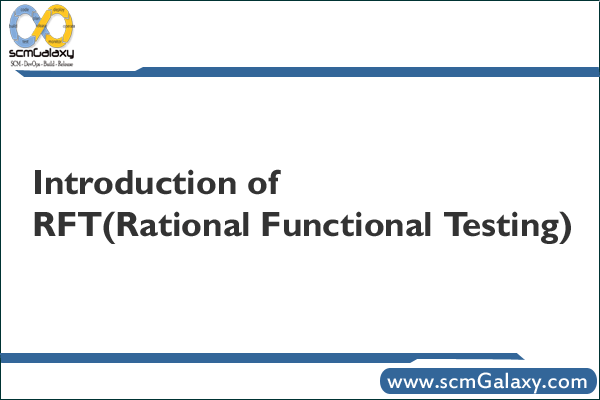

Introduction of RFT(Rational Functional Testing)
Functional Tester is available in two integrated development environments and two scripting languages.
Functional Tester, Java™ Scripting uses the Java language and the IBM® Rational® Software Delivery Platform.
Functional Tester, VB.NET Scripting uses the VB.NET language and the Microsoft® Visual Studio .NET development environment.
Use Functional Tester to:
- Perform full functional testing. Record and play back scripts that navigate through your application and test the state of objects through verification points.
- Create and edit simple and easy-to-read, object-oriented test scripts. In addition to automatically recording test scripts, Functional Tester contains wizards for generating code, for example, for automatically creating a verification point. Functional Tester’s test scripts are implemented in your choice of Java or VB.NET.
Object Based Testing
The object-oriented recording technology in Functional Tester lets you generate scripts quickly by recording applications against the application-under-test. Functional Tester uses object-oriented technology to identify objects by their internal object properties, not by screen coordinates. If the location or text of an object changes, Functional Tester can still find it on playback.
The object testing technology in Functional Tester enables you to test any object in the application-under-test, including the object’s properties and data. You can test objects in Java, VB.NET, Windows®, and Web-based applications, whether they are visible or hidden in the interface.
When you record a script, Functional Tester automatically creates a test object map for the application-under-test. The Functional Tester test object map lists the test objects available in the application, whether they are currently displayed or not. You can also create a new test object map, either by pasing it on an existing map or by adding objects as required. The object map provides a quick way to add objects to a script. Since the test object map contains recognition properties for each object, you can easily update the recognition information in one central location. Any scripts that use this test object map also share the updated information.
Verification points
During recording you can insert verification points into the script to confirm the state of an object across builds of the application-under-test. The verification point captures object information (based on the type of verification point) and stores it in a baseline data file. The information in this file becomes the baseline of the expected state of the object during subsequent builds. Functional Tester has an object properties verification point and five data verification points (menu hierarchy, table, text, tree hierarchy, and list). You can use the Verification Point Comparator to analyze differences across builds and update the baseline file.
Platform-independent
Functional Tester features platform-independent and browser-independent test playback. For example, you can record a script on Windows and play it back on Linux®. You can record a script using Firefox, Mozilla, Internet Explorer or Netscape. Because the script contains no references to the browser used during recording, you can play back the script using any of the supported versions of Firefox, Mozilla, Internet Explorer or Netscape.
Integrated with Rational TestManager
Functional Tester is integrated with Rational TestManager, which enables you to record and play back a Functional Tester script from TestManager and make use of TestManager features, such as the Log. If you have TestManager installed, you can use these integrated features. See Understanding Functional Tester integrations for information.
Integrated with Rational ClearQuest
Functional Tester is also integrated with Rational ClearQuest® Test Manager, which enables you to play back a functional test script from ClearQuest TestManager, generate logs, and track defects. If you have ClearQuest Test Manager installed, you can use these integrated features.
- How to remove sensitive warning from ms office powerpoint - July 14, 2024
- AIOps and DevOps: A Powerful Duo for Modern IT Operations - July 14, 2024
- Leveraging DevOps and AI Together: Benefits and Synergies - July 14, 2024

